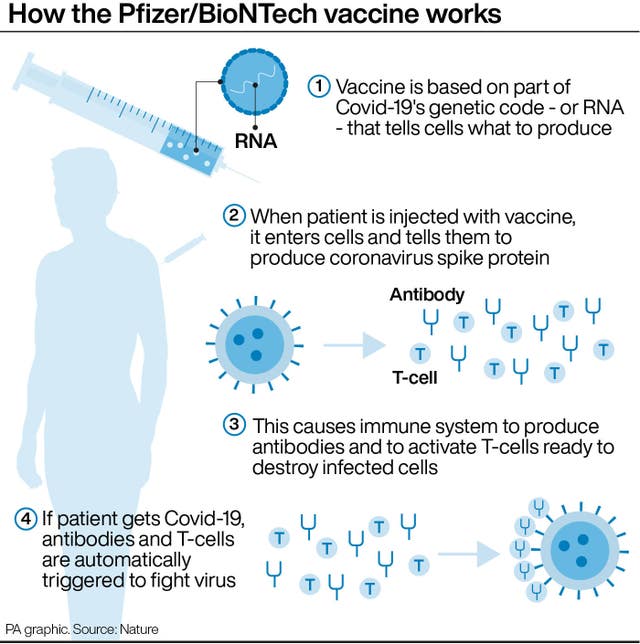Allergy warning over Pfizer Covid-19 vaccine
Pfizer said the vaccine was ‘well tolerated’ during the trials with ‘no serious safety concerns’.

People with a history of life-threatening allergic reactions to a vaccine or food should not get the Pfizer Covid-19 jab, the head of the UK’s medicines regulator said.
But June Raine, chief executive of the Medicines and Healthcare products Regulatory Agency (MHRA), said anaphylaxis was a “known … very rare side effect with any vaccine”.
It comes after two NHS staff members who received the jab on Tuesday had allergic reactions after being given the Pfizer/BioNTech vaccine.
The health workers, who are understood to both have a history of severe allergic reactions, were among thousands to receive the vaccine on the first day of the Covid-19 mass vaccination programme.
A further report of a possible allergic reaction following immunisation was also received by the MHRA.
Dr Raine said a group including experts on allergy and clinical immunology was convened on Wednesday to consider any possible mitigation to the “rare risk of anaphylaxis”.
She said: “Any person with a history of anaphylaxis to a vaccine, medicine or food should not receive the Pfizer BioNTech vaccine. A second dose should not be given to anyone who has experienced anaphylaxis following administration of the first dose of this vaccine.
“Anaphylaxis is a known, although very rare, side effect with any vaccine. Most people will not get anaphylaxis and the benefits in protecting people against Covid-19 outweigh the risks.”
Pfizer said the vaccine was “well tolerated” during the trials with “no serious safety concerns”.
Dr Raine added: “You can be completely confident that this vaccine has met the MHRA’s robust standards of safety, quality and effectiveness.
“The safety data has also been critically assessed by the government’s independent advisory body, the Commission on Human Medicines. No vaccine would be approved unless it meets these stringent standards – on that you can be sure.”
Peter Openshaw, past-president of the British Society for Immunology and professor of experimental medicine at Imperial College London, said: “As with all food and medications, there is a very small chance of an allergic reaction to any vaccine.
“However, it is important that we put this risk in perspective. The occurrence of any allergic reaction was one of the factors monitored in the phase three clinical trial of this Pfizer/BioNTech Covid-19 vaccine, the detailed data from which was released yesterday.
“In this, they reported a very small number of allergic reactions in both the vaccine and placebo groups (0.63% and 0.51%).

“Similar to the rollout of all new vaccines and medications, this new Covid-19 vaccine is being monitored closely by the MHRA.
“They will now investigate these cases in more detail to understand if the allergic reactions were linked to the vaccine or were incidental.
“The fact that we know so soon about these two allergic reactions and that the regulator has acted on this to issue precautionary advice shows that this monitoring system is working well.”





